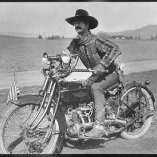
Dusty Devil Dale
Members-
Posts
3,473 -
Joined
-
Last visited
Previous Fields
-
SASS #
105091
-
SASS Affiliated Club
Kings River Regulators
Profile Information
-
Gender
Male
-
Location
Central CA
-
Interests
Wood carving, guitar making/playing, machining, metal fabrication, big tuna
Recent Profile Visitors
6,049 profile views
Dusty Devil Dale's Achievements

SASS Wire Vet (1/1)
2.8k
Reputation
-
July 24th. 111 deg in Fresno, Ca. Just right for getting yard work done. If you stay hydrated and keep moving (and don't think too much), it isn't that bad.
-
Look around at all of your good friends!
-
Look closer!
-
One thing that narrows our participation to "nicer" players is the fact that we resist temptation to shoot for the huge cash or other prizes and endorsements that we see in everything from bass or marlin fishing to tournament trap, tennis, or golf. We always laugh about not winning the Cadillac, but it assures that people come here for the game, the fun and the social engagement. That is not the case in other competitive sports, where big prizes drive their "Who is comming" lists. In other shooting sports, many competitors are glad to see a competitor fall, or drop a firearm, or have a squib or jamb. In CAS, we line up to help, loan them our equipment, supply their forgotten ammo or repair their guns. Then we go BBQ, eat and laugh together. Our big prizes come from raffles or other things that are aside to the shooting. Instead, we play for $2.50 medals, $40 belt buckles, bragging rights and FUN WITH FRIENDS. Somehow we have resisted the temptation to shoot for prizes like new XL750s, bass boats or Jeeps, and our "demographics" reflect that.
-
Below the median anyway.
-
An unusual stage direction.
Dusty Devil Dale replied to H. K. Uriah, SASS #74619's topic in SASS Wire
SW is correct, Yul. One person resetting the Star correctly is actually much faster than two or three people getting into each others way. Several of us played around for an afternoon, looking for the fastest way to do the reset. One person who knows the technique can break 30 seconds, even including plate pick up time, and the best part is that when properly done, the Star is already in balance. You just walk away. It does not spin. When a second person tries to hold the arms in position, the resetting person has to set plates in awkward positions, which takes much longer and can eat fingers. But done properly, standing at the side, facing the edge of the wheel, the arms fall right into the resetter's comfortable sweet spot as soon as you start attaching the plates. After the first plate is attached, you dont even have to pull the arms. Gravity does it for you. Just catch each arm as it drops into position. Next time we have the T-Star set up, I'll make a short video to post here. You are right though, Yul. most folks take forever between shooters. Maybe a clear video can help that. My experience is that shooters do enjoy shooting the T-Star. -
You did not mention what brand your primers are or if you changed brands in that last problem year. For cowboy guns, there is a huge difference in hardness between brands. Also, the recess below the chamber where the lower extractor tab fits looks deformed and possibly occluded in the photos. Could the tab be deformed, or crud in the recess holding the bolt back? Finally, have you disassembled the toggles? are any of the toggle pins bent or deformed? (Personally, I would be hesitant to fire any rifle with a bolt that does not close tightly, unless you like hot gasses in your face -- or worse)
-
Taylor’s & Co TC73 9mm
Dusty Devil Dale replied to John Barleycorn, SASS #76982's topic in SASS Wire Saloon
I'm wondering how they keep the lever stroke SASS legal and still avoid short round jambs with the short cartridges? Also, how do they handle/extract the rimless 9mm? It will be interesting to look at one--- but for me, not $2100 worth of interesting. -
They should have named them after Biden. His hallmark. But there's a much cheaper way to DIY these and save the $800.
-
Aurora Borealis-- who is seeing it?
Dusty Devil Dale replied to Dusty Devil Dale's topic in SASS Wire Saloon
In our area, a 5' rattlesnake is a really big specimen. Most adult snakes around central CA are well under 4'. It was just laying there on the road warming up, and in a remote area, so I left it to its evening, rather than messing with it in dark. I've had some real surprises in the past trying to walk up and kill rattlers in the headlights with a shovel, even after they've been run over. They can move real fast when they need to. -
Drove out last night with my wife to see if we could see the Aurora from our Central Ca cowboy range. I stopped beside the road at around midnight, but there were still a lot of car headlights interfering with my cateracts. So we walked a ways along the road and onto a side road to try to find better darkness, but we still couldn't see anything worth the drive. We gave it up after a half-hour and climbed back into the pickup. When I switched the headlights on there was a 5' rattler stretched out on the road about 10 ft ahead of the truck, right where both of us had been walking around. He/she may have rattled, but neither of us can hear that frequency any more. At least we had some Saturday Night excitement. ( It doesn't take a lot to entertain us any more. )
-
2024 SASS Western Regional / 29th Annual Chorro Valley ShootOut
Dusty Devil Dale replied to Roger Rapid's topic in SASS Wire
Roger, Are there limits on how long shooters may camp before or after the scheduled event-- i.e., to go enjoy the central coast or to help with match set up or break down? -
Does Wrangler collapse to Cowboy if not enough entries?
Dusty Devil Dale replied to Popcorn Kelly's topic in SASS Wire
But how do you determine if they have other age-eligibility, without knowing their actual age? -
DON'T get me started!

.thumb.jpg.42f9340f5815e3915f9a0b0991f5aa8f.jpg)




